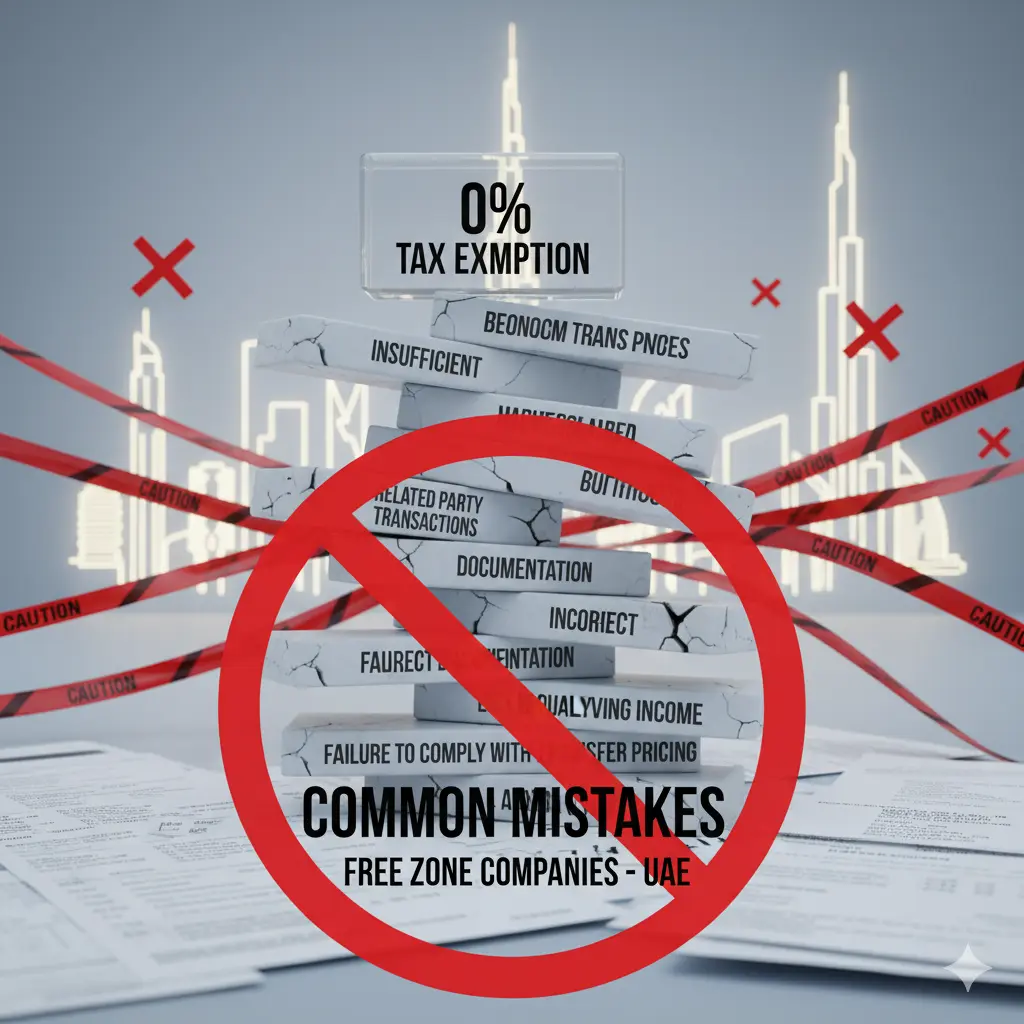Common Mistakes Free Zone Companies Make When Claiming 0% Corporate Tax Exemption in the UAE

The UAE Corporate Tax (CT) regime has created a strong impression among businesses that setting up in a free zone automatically guarantees a 0% corporate tax exemption. While free zones indeed provide significant tax incentives, the reality is that the exemption is not automatic. It comes with a set of strict conditions under the UAE Corporate Tax Law and Cabinet Decisions.
Unfortunately, many free zone companies overlook these requirements and risk losing their eligibility. Below are some of the common mistakes that free zone businesses make when assuming they qualify for the 0% corporate tax rate.
1. Assuming the 0% Rate is Automatic
Many companies believe that simply holding a free zone license makes them a “Qualifying Free Zone Person.” In reality, the law requires a company to meet several substance, activity, and compliance conditions. Failure to do so can result in being taxed at the standard 9% corporate tax rate.
2. Ignoring the Substance Requirements
To qualify, a free zone entity must demonstrate adequate substance in the UAE. This includes having sufficient employees, assets, and operating expenditures within the free zone.
Mistake: Operating only through a flexi-desk or minimal office space with little or no staff, while recording significant revenue, often fails the substance test.
3. Earning Non-Qualifying Income Without Monitoring
The 0% exemption applies only to Qualifying Income such as transactions with other free zone entities or exports outside the UAE.
Mistake: Companies earning revenue from mainland UAE customers (end-users), retail sales, or other non-qualifying sources without proper monitoring. These activities can either disqualify them entirely or push them into the de-minimis rule limits (where non-qualifying revenue cannot exceed 5% or AED 5 million, whichever is lower).
4. Overlooking the De-Minimis Rule
Even small amounts of non-qualifying income can create compliance issues.
Mistake: Failing to maintain proper trackers and documentation of qualifying vs non-qualifying income, which may later expose the company during an FTA audit.
5. Not Maintaining Proper Accounting and Audit Records
Free zone companies are required to prepare audited financial statements to claim the 0% rate.
Mistake: Businesses assuming that because their free zone authority doesn’t demand audited accounts every year, they can skip it. Without audited financials, exemption claims are at risk.
6. Ignoring Ministerial Conditions and Updates
The UAE Ministry of Finance issues guidance and additional conditions from time to time.
Mistake: Companies not staying updated on these requirements, or assuming their business activity automatically falls under the exempted list, which may not be the case.
7. No Focus on Compliance Audits
Many free zone companies neglect the importance of a compliance audit to validate their exemption claim.
Mistake: Relying on assumptions rather than having a professional auditor confirm their eligibility, leaving them exposed if challenged by the tax authorities.
Conclusion
The UAE’s free zones remain an attractive hub for businesses, but claiming a 0% corporate tax exemption is far from automatic. Companies must demonstrate substance, monitor qualifying income, maintain audited records, and comply with ministerial conditions.
At Accruon Auditing LLC, we help free zone businesses navigate these requirements through compliance audits, advisory services, and ongoing monitoring—ensuring that your company not only claims the exemption but sustains it without risk.
